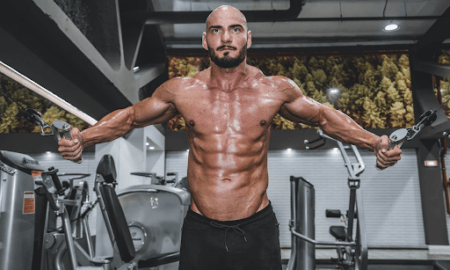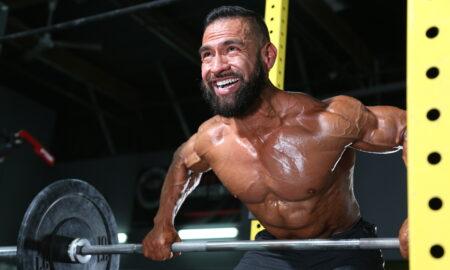Note that the lessons aren’t listed in any particular order.
Lesson 1. While I was at college in England, I trained in a gym where one of Europe’s elite physiques at the time worked out. We often trained at the same time. He helped me learn perhaps the biggest lesson in bodybuilding. He was on bodybuilding drugs and, generally, was a genetic muscle-building phenomenon. He hadn’t neglected his calves, but I had better calf development, even though I was drug-free and had been training for far fewer years. He asked me for advice on how he could improve his calves.
The explanation for the difference in our calves was our heredity. I had better genetics for calf development, but he was much better off in all other body-parts. I trained my calves the way I trained my arms, chest and shoulders, but my calves were the most responsive.
The lesson: Provided you train sensibly and fully attend to the components of recuperation, the most important factor determining your bodybuilding success is genetic, and you have no control over that. Even so, while acknowledging your genetic constraints, don’t use them as an excuse not to seek progress. Bodybuilding should be about personal satisfaction from improving your own physique, and you can realize tremendous enjoyment from it even if you never enter a physique competition.
Lesson 2. For many years muscles were more important to me than anything else in my life. I craved to be a professional bodybuilder. I neglected school work, social activities and sport in my quest to build a great physique. My education suffered, my social skills suffered, I became a near recluse, and I didn’t pursue sports where I had some natural talent. I spent a huge amount of time training, thinking about training, studying training and thinking about everything related to bodybuilding. That amount of time, otherwise applied, could have earned me two doctoral degrees, for example.
One of the biggest regrets I have is that I didn’t get the education I was capable of. I still got a bachelor’s degree, but my options were severely limited, and I never fully committed to the degree because of my obsession with bodybuilding. I still could have been highly dedicated to bodybuilding but without making it the obsession that made me neglect everything else. I couldn’t see that at the time, however.
The lesson: Be dedicated so that you train 100 percent well and recuperate 100 percent well, but don’t neglect other aspects of your life.
Lesson 3. Despite 100 percent commitment to bodybuilding, my initial gains were only modest. After I got even more “serious” about my training—increasing its volume, frequency and intensity—progress came to a halt. Then started my appreciation of “hardgaining.” I learned that there was much more to bodybuilding success than effort and dedication. In addition to the critical role of heredity, I learned about the need to use training routines appropriate to the individual and not to imitate training methods used by people who have great genetic advantages for bodybuilding. After that I had years of training progress and satisfaction.
The lesson: Train on routines that are appropriate for you.
Lesson 4. One of the most memorable sentences I’ve ever heard came from Charles A. Smith shortly before his death in 1991. Charles was a major figure, having worked on Joe Weider’s bodybuilding magazines in the 1950s, and one of the final links with the pioneers of bodybuilding. Here’s what he told me: “You never know how important good health is until you no longer have it.”
When you’re healthy, all problems and challenges can be tackled. Without your health, the problems and challenges of life are magnified. “He who has health has hope, and he who has hope has everything.”
During my youth I sought muscle and strength primarily for aesthetic reasons, and I mistakenly thought that training was for young people only. Today, at 51, I still have aesthetic concerns, and I still love to train—I would continue to train for those reasons alone. The health-related benefits of muscle and strength, however, are the most important.
Besides building strength and developing muscle, bodybuilding strengthens bones, improves overall fitness, increases the body’s calorie consumption, helps control bodyfat, improves posture, slows the effects of aging and increases resistance to injury. No other single form of exercise can produce all those benefits.
While I made many mistakes with my training and nutrition when I was young, I never got into drugs. Consequently, today I’m not dealing with drug-related health problems in my middle age, unlike many of my peers who did take performance-enhancing drugs—primarily anabolic steroids.
Train for health and physique, not just physique. Health comes first. You may not believe it now if you’re young, but you will believe it later when you’re not so young. Some former, highly successful bodybuilders and strength athletes are testaments to lives ruined by a drug-fueled obsession. Many ruined their health as a result of taking performance-enhancing drugs, and some died prematurely. When young and vigorous and seemingly indestructible, they took big risks with their health with little or no consideration for future repercussions.
The lesson: Your health is your most important possession. Treasure it, and take great care of it—for your own sake and those who depend on you.
—Stuart McRobert
www.Hardgainer.com
Editor’s note: Stuart McRobert’s first byline in IRON MAN appeared in 1981. He’s the author of a 638-page opus on bodybuilding, Build Muscle, Lose Fat, Look Great, available from Home Gym Warehouse, (800) 447-0008, or www.Home-Gym.com.




















You must be logged in to post a comment Login